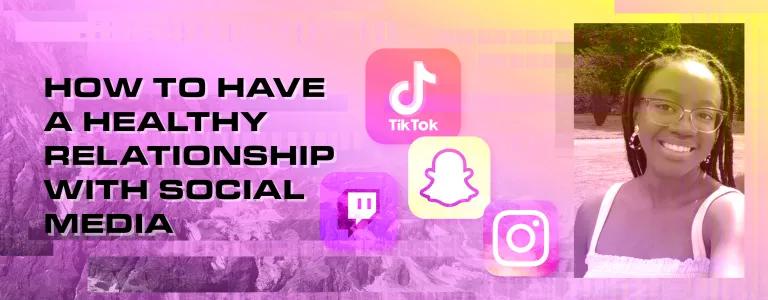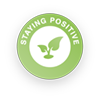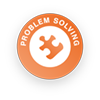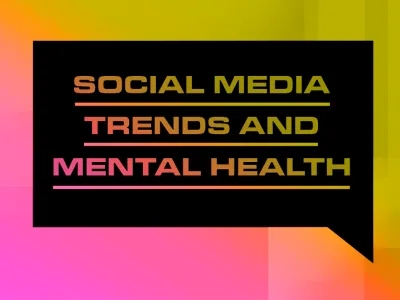
How To Have A Healthy Relationship With Social Media
Include this article in your Skills Builder Journal. It could help you develop... 

It’s hard to get away from social media these days. From TikTok to Insta to Snap to Twitch to Facebook to Twitter to Wattpad, people's lives are literally on our screens 24/7. But that doesn’t necessarily mean it has to be a bad thing. Here, Courtney explores how to make social media work for you, in a healthy way...
I’m sure we all had those initial plans at the start of lockdown, you know, to actually do work, exercise weekly, meditate, eat healthily, and go to bed early. But for some reason, those plans never manifested themselves. You might have even changed into some workout clothes but then spent two hours on the sofa scrolling on TikoTok during your “break”. Or maybe you made yourself a lovely vegan meal but spent at least an hour finding some YouTube entertainment to watch and it went cold. I think it’s safe to say a lot of us have had a toxic relationship with social media and I think it's time we broke up with our habits in favour of some healthier boundaries. Whilst you can’t do a complete redo, you can set yourself up for a better, healthier future.

An unhealthy relationship with social media can have significant negative effects on your physical and mental health. This can be characterised by not having boundaries in terms of time restriction. Continuous use of your phone for an excessive amount of time can affect your sleep patterns and eyesight. Your attention span can also shorten as it's most likely you’re consecutively consuming entertainment in short-form through clips or photos. You are also more likely to procrastinate whilst doing something else - for example, I had the majority of my university course online last year and found myself tuning into lectures and looking through my phone at the same time. Set yourself some boundaries, like only using your phone at specific times, or use the app limits/screen time functions that most phones have, where you can disable certain apps during certain times of the day.
Boundaries should also be considered when it comes to how you interact with others on apps. Most people only show their highlight reel online so it’s unfair to compare it to your daily life. Following people out of envy for their looks, lifestyle, or career isn’t empowering. There’s a difference when people inspire you and you learn from them, compared to having that sinking feeling everytime they post something new. During lockdown, I found that I felt worse when I checked up on people on Instagram. It seemed so many people were having the time of their lives at university, whilst that just wasn’t my experience. I felt insecure and as if I wasn’t doing the right things and it exaggerated the loneliness I was already feeling. Not putting boundaries on who I followed meant I felt overwhelmed by the content being posted. Now, I only follow people who really make me happy and who brighten up my timeline. There’s no point following anyone who makes you feel bad about your life! When you follow people who give you a positive outlook and push to create better content for yourself, it can lead to an “attitude of gratitude”. As cheesy as it sounds, having a positive attitude and feeling fulfilled with what you already have will help you easily navigate away from any feelings of envy when they rise up. Daily journaling exercises of writing down what you’re grateful for or following a gratitude daily plan from Pinterest can help with this. Doing it with a friend can also be a great way to support each other and hold each other accountable.

Using social media purely for affirmation and validation can mess up your internal sense of self-worth - as you will find yourself overly relying on other people’s perception of you to feel good. This can lead to all sorts of anxious feelings over how people will respond to what you post, how many likes and comments you’ll get, and you’ll probably end up feeling worse if you don’t get a certain amount of likes etc. So make sure that when you post, you’re posting for you, for your happiness...the likes are just a bonus. Of course if you’re trying to share things that you’ve made, like art or music, you want people to engage with what you share, and that’s fine! However, it becomes dangerous when you categorise your selfie at the park, or the picture of you at the beach in the same way. You don’t have to market yourself as a product to gain validation from others.
Another thing you can do that can help, which is quite a big step, is deleting your social media temporarily. That doesn’t mean get rid of it altogether, but you could choose to disable your accounts during the school week, or maybe once a month over a weekend, to go off grid and have a social break. These little cleanses might be what helps you have long-term positive changes in how and when you use it.

Just remember, you are worthy of happiness and good mental wellbeing! You get to take part in those little victories everyday like choosing yourself over choosing something that would make you feel insecure or any less than you are. Living vicariously through a persona online or through other people has its limitations - it’s fleeting and it's also unstable in how consistent it is. You get to reclaim what social media means to you, so make it work for you, don’t work for it!


